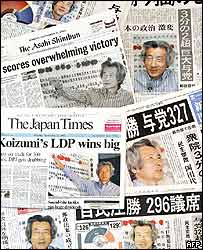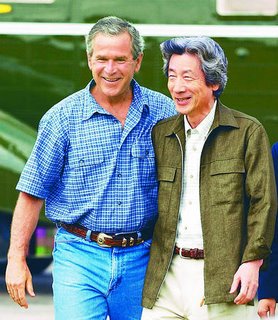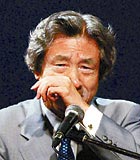 Koizumi's political drama drew cheers, boos
Koizumi's political drama drew cheers, boosMakoto Miyazaki, Takashi Noguchi and Kiyofumi Matsunaga / Yomiuri
The postwar era's third-longest administration, led by Prime Minister Junichiro Koizumi, will end on Sept. 26, when the extraordinary Diet session is convened.
Here we look back at some symbolic events of the political drama that the 64-year-old prime minister simultaneously starred in, and directed.
Koizumi, who declared he would "destroy the Liberal Democratic Party," won the party's presidential race in April 2001. His Cabinet recorded the highest approval rate in history--85.5 percent--according to a survey conducted in May 2001. This surpassed the approval rating of 73.5 percent for the Cabinet led by Prime Minister Morihiro Hosokawa, according to a November 1993 survey.
Koizumi's first Cabinet attracted unprecedented attention: He appointed popular lawmaker Makiko Tanaka and economist Heizo Takenaka as foreign minister and state minister in charge of economic and financial policy, respectively. Many TV gossip shows featured Cabinet ministers' movements almost every day.
"Isn't it [the Cabinet he appointed] astonishing?" Koizumi reportedly said to LDP executives with a satisfied look, after having formed his first Cabinet.
As Koizumi had boasted they would, the cabinet appointments attracted much attention and were full of surprises. This was due to the fact that, unlike his predecessors, he refused to consider the LDP factions' wishes in his ministerial appointments.
However, Tanaka soon came into conflict with Foreign Ministry officials due to her unconventional and often extraordinary behavior--she even canceled a meeting with a U.S. senior official shortly after assuming her post. The "heroine" whom Koizumi had once relied on as the source of his public support turned out to be a "sticking point" for his Cabinet.
In January 2002, Koizumi finally dismissed both Tanaka and a Foreign Ministry senior official with whom she had frequent spats. After the incident, the Cabinet's approval ratings plummeted.
However, Koizumi's surprise visit to Pyongyang in September 2002 helped his Cabinet regain public support.
The tragic cases of Japanese abducted by North Korea were revealed after Koizumi's first meeting with North Korean leader Kim Jong Il, igniting anti-North Korea sentiment among Japanese while boosting support for Koizumi's diplomacy. The Cabinet's approval rating rallied to 66.1 percent in a survey conducted shortly after his visit to North Korea, which was up 20.4 points from the previous month's survey.
Though the United States at first expressed distaste for Koizumi's diplomacy with North Korea, which was suspected of developing nuclear weapons, Koizumi did not change his direction. The diplomatic methods he used to press his assertions, unlike those his predecessors had traditionally adopted, also garnered popular support.
In another example of his uniqueness, Koizumi supported the U.S.-led invasion of Iraq in 2003, even though France and Germany opposed it. He also dispatched 600 members of the Ground Self-Defense Force to areas considered dangerous, opening up a new frontier in Japan's international cooperation activities.

Another of Koizumi's unique diplomatic style was his annual visit to the war-linked Yasukuni Shrine, despite domestic and foreign opposition. Consequently Chinese and South Korean leaders refused to hold summit talks with him.
The highlight of Koizumi's political drama may have been his showdown with LDP rebels who refused to agree to his postal privatization policy.
After the postal privatization bills were rejected by 17 votes in the House of Councillors during a 2005 ordinary Diet session, Koizumi immediately dissolved the House of Representatives, saying he would ask for the public's judgment over postal privatization.
For the lower house election, Koizumi fielded so-called assassins in the constituencies of the rebels who had voted against the postal privatization bills, to prevent them from returning to the Diet. Koizumi's determination to win the political battle, which some people said was overly ruthless, gained the interest and support of the public, including floating voters, and helped the LDP win a historic victory. The postal privatization bills were passed at an extraordinary Diet session after the election, and Koizumi's long-cherished wish was accomplished.
In a November speech, Koizumi spoke about the lower house election in which the rebels were virtually wiped out, saying, "It [the election] changed the LDP dramatically."
(Sep. 19, 2006)
No comments:
Post a Comment